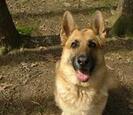The Golden Years
posted: Wed Oct 28 13:57:29 EDT 2015 by: Fredericksburg Animal Hospital Tags: "Clinic Specials" "News"
We may see various physical and mental changes in our older pets. By being alert to these changes and promptly reporting them to their veterinarian we can help insure that the geriatric pet’s quality of life continues into his or her “golden years”.
Older pets need more frequent nail trims. Long nails put unnecessary pressure on joints and can aggravate arthritis. Older skin and haircoats may become dryer and more easily matted. An overweight or arthritic pet is not able to do the self grooming they may have done in their youth. Your veterinarian may recommend more regular brushing, fatty acid supplements or moisturizing shampoos to help maintain a healthy coat.
Regular brushing will also allow you to be more aware of changes in your pet’s body. In particular, new lumps and bumps that may arise. Cancer is scary to think about, but many lumps are benign and require minimal treatment.
Aging pets may experience hearing or vision loss. Cataracts are common and can even be treated by specialists in some cases.
Our older pets often begin to walk stiffly and have difficulty climbing stairs. Do not assume this stiffness is an untreatable part of the aging process. Your veterinarian can examine your pet to determine the origin and extent of this discomfort. There are many excellent medications available to help relieve the pain of arthritis. DO NOT EVER GIVE OVER THE COUNTER OR HUMAN MEDICATION TO YOUR PET WITHOUT CONSULTING YOUR VETERINARIAN.
There are many practical ways to increase an older pet’s comfort. Extra padding for beds helps arthritic pets. Older cats may need a litterbox with lower sides. Raised food bowls make eating more comfortable for the arthritic pet. These are just a few ideas to make the golden years more comfortable.
Weight control is another issue for older pets. Regular weigh ins can help you track your pets gains or losses. We are always happy to weigh your pet at no charge if you stop by. The best hours are between noon and 3 on weekdays. Discuss the appropriate diet for your aging pet with your veterinarian.
Bloodwork is one of the most important tools we having for assessing any pet’s general well being. Ideally older pets should have blood tests done twice yearly to assess their well being. Baseline bloodwork is a great thing to do for any patient. That way your veterinarian knows what is normal for your pet and can see changes in their overall condition before they become symptomatic. Our lab is offering a savings on senior bloodwork in March and we are passing the savings on to you. It’s a great opportunity to get started on a health care plan to make the golden years as wonderful as possible for your best friend(s). Call our reception staff for more information. 540-373-6512.











